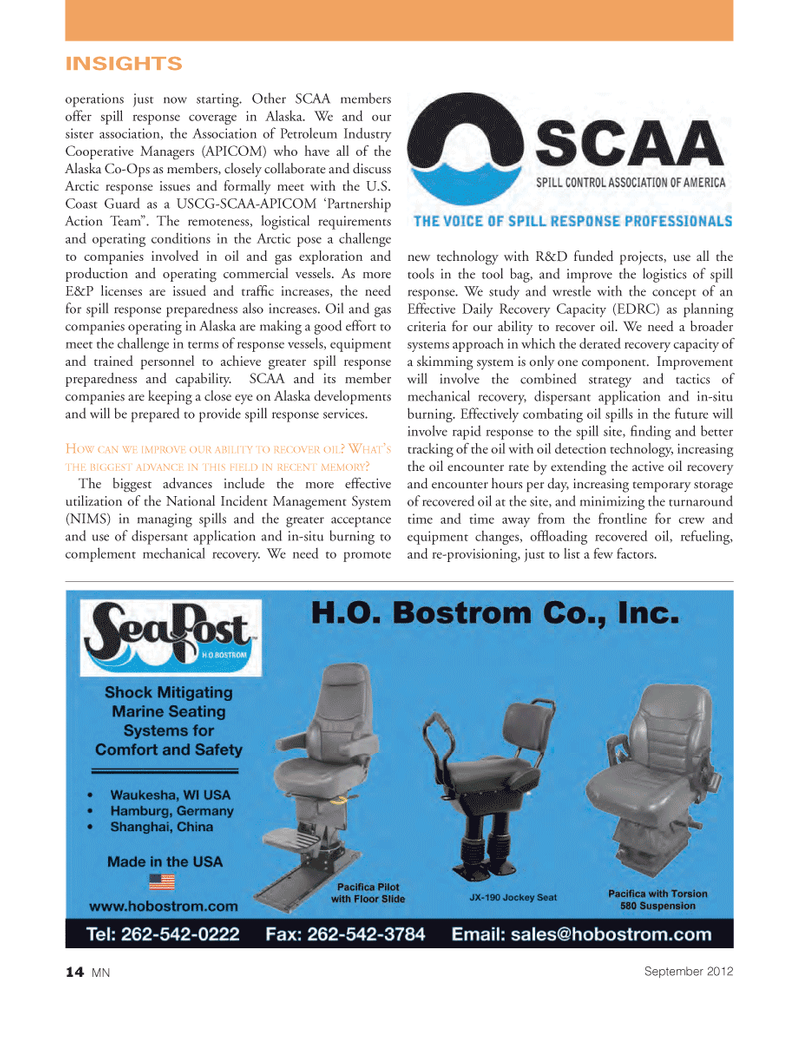
Page 14: of Marine News Magazine (September 2012)
Environment: Stewardship & Compliance
Read this page in Pdf, Flash or Html5 edition of September 2012 Marine News Magazine
INSIGHTSoperations just now starting. Other SCAA members offer spill response coverage in Alaska. We and our sister association, the Association of Petroleum Industry Cooperative Managers (APICOM) who have all of the Alaska Co-Ops as members, closely collaborate and discuss Arctic response issues and formally meet with the U.S. Coast Guard as a USCG-SCAA-APICOM ?Partnership Action Team?. The remoteness, logistical requirements and operating conditions in the Arctic pose a challenge to companies involved in oil and gas exploration and production and operating commercial vessels. As more E&P licenses are issued and traf c increases, the need for spill response preparedness also increases. Oil and gas companies operating in Alaska are making a good effort to meet the challenge in terms of response vessels, equipment and trained personnel to achieve greater spill response preparedness and capability. SCAA and its member companies are keeping a close eye on Alaska developments and will be prepared to provide spill response services. HOW CAN WE IMPROVE OUR ABILITY TO RECOVER OIL? WHAT ?S THE BIGGEST ADVANCE IN THIS FIELD IN RECENT MEMORY ? The biggest advances include the more effective utilization of the National Incident Management System (NIMS) in managing spills and the greater acceptance and use of dispersant application and in-situ burning to complement mechanical recovery. We need to promote new technology with R&D funded projects, use all the tools in the tool bag, and improve the logistics of spill response. We study and wrestle with the concept of an Effective Daily Recovery Capacity (EDRC) as planning criteria for our ability to recover oil. We need a broader systems approach in which the derated recovery capacity of a skimming system is only one component. Improvement will involve the combined strategy and tactics of mechanical recovery, dispersant application and in-situ burning. Effectively combating oil spills in the future will involve rapid response to the spill site, nding and better tracking of the oil with oil detection technology, increasing the oil encounter rate by extending the active oil recovery and encounter hours per day, increasing temporary storage of recovered oil at the site, and minimizing the turnaround time and time away from the frontline for crew and equipment changes, of oading recovered oil, refueling, and re-provisioning, just to list a few factors. 14 MNSeptember 2012MNSept2012 Layout 1-17.indd 14MNSept2012 Layout 1-17.indd 148/30/2012 2:47:05 PM8/30/2012 2:47:05 PM

 13
13

 15
15
